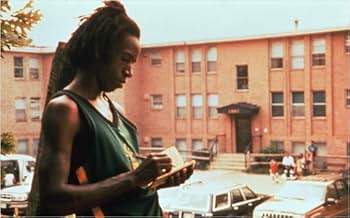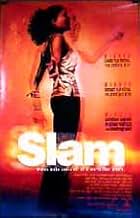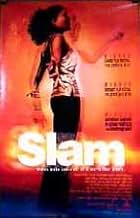Großer Preis der Jury, Sundance Film Festival 1998. Ein talentierter Jugendlicher (Saul Williams) bewältigt Kriminalität und Verzweiflung in der Stadt, indem er an Poetry Slams teilnimmt. So... Alles lesenGroßer Preis der Jury, Sundance Film Festival 1998. Ein talentierter Jugendlicher (Saul Williams) bewältigt Kriminalität und Verzweiflung in der Stadt, indem er an Poetry Slams teilnimmt. Sonja Sohn aus "The Wire" spielt mit.Großer Preis der Jury, Sundance Film Festival 1998. Ein talentierter Jugendlicher (Saul Williams) bewältigt Kriminalität und Verzweiflung in der Stadt, indem er an Poetry Slams teilnimmt. Sonja Sohn aus "The Wire" spielt mit.
- Auszeichnungen
- 4 Gewinne & 4 Nominierungen insgesamt
- Public Defender
- (as Rhozier T. Brown)
Empfohlene Bewertungen
Also, anyone who knows Washington, D.C. will recognize that this was a great use of D.C. as the setting for a movie. Usually D.C. is used as just a pretty backdrop, but in this movie you saw real sites like the Projects of Southeast and Capitol Hill's Eastern Market, and recognized that D.C. is a city of real people and not just a place aliens blow up.
In the movie there are many things that try to define Ray: society and race and the justice system are some of the major ones. Somehow with all the forces against him through expression and poetry Ray defines himself. After getting arrested for a small charge of possession of marijuana because of the justice system he is forced to either confess or go to court and fight it which would wither way get him 3-10 years. There was no winning for him.
With the themes of race, drugs, gangs and jail this movie makes it easy for people to connect to. One of the best parts of the movie was at the end when Ray finally finds his way and performs in a poetry slam. It was a powerful scene full of emotion. This movie sends many different messages. One of which is when you find something you are passionate for you should find a way to show others and express yourself through it. For example when Ray performed at the poetry slam; it wasn't his usual scene but he got out of his bubble and went for it.
To quickly generalize: if you appreciate Spike Lee's work, you'll probably like Slam. Although Spike might be a little upset that a white Jewish director brought this to film :-)
Basic story in two sentences Raymond Joshua (Saul Williams, also one of the film's co-writers) is set up to go to prison for pot, and while in prison he meets a few people that recognize his skills as a writer and poet.
When he gets out he wants to hold on to the freedom he knows he can attain, but he doesn't know how. With this conflict, Raymond is a character that is recognizable and identifiable with the audience. And with this, Williams creates a constantly believable performance even when his character may not sound entirely believable or realistic.
Although the performances are a plus for the film's success, such as Bonz Malone as Hopha, and Sonja Sohn as the writing teacher/poet Lauren, for me the style over-passed the substance. Though the poetry was inspired and the poets in the film who spoke them were very good, some of the story elements were not as effective as they could've been. For example, there's a blind-men analogy when Raymond gets out of jail and sees that his pot-dealer friend, who got shot, is now blind. Raymond is morally in the right in their final scene together, but it's a little too thick of a message for my taste when Raymond says, 'I once was blind too, now I can see.' Williams' poetry (which I assume he wrote himself) is interesting, although it's his delivery that catches my ear over the content. In a pivotal scene his poetry saves him from a beating in the prison yard, yet somehow it doesn't feel as real as some of the other scenes, like with him and Malone's character.
As I said, the style was what held the film, especially for such a low budget. I loved the use of the hand-held, shaky mis-en-scene, as though someone was allowed to peek into the atmosphere of DC. And from a psychological standpoint, Levin seems to extract what the essence is of Raymond and his neighborhood. Through his usage grainy color and then to a 8mm camcorder for flashbacks from Raymond, I felt the emotional impact that Levin was going for, the mix of disorientation and of being in a free-fallin' kind of society where you don't know what can happen next. I just wished that I saw more of that with the characters and the story. Cool ending though. B
Wusstest du schon
- WissenswertesThis film was restored by the Academy Film Archive and the UCLA Film & Television Archive. Funding was provided by the Academy of Motion Picture Arts and Sciences, Sundance Institute, UCLA Film & Television Archive, and the restoration premiered in 2024 at the UCLA Festival of Preservation.
- PatzerWhen Ray is on his way to the poetry night, he gets on the metro at the Cleveland Park station, rides, and gets off at the metro at the same station: Cleveland Park.
- Zitate
Ray Joshua: The wind is the moon's imagination wandering. It seeps through cracks, ripples the grass, explores the unknown. My love is my soul's imagination. How do I love you? Imagine.
Top-Auswahl
- How long is Slam?Powered by Alexa
Details
Box Office
- Budget
- 1.000.000 $ (geschätzt)
- Bruttoertrag in den USA und Kanada
- 1.009.819 $
- Weltweiter Bruttoertrag
- 1.009.819 $
- Laufzeit
- 1 Std. 40 Min.(100 min)
- Farbe
- Sound-Mix
- Seitenverhältnis
- 1.85 : 1




























